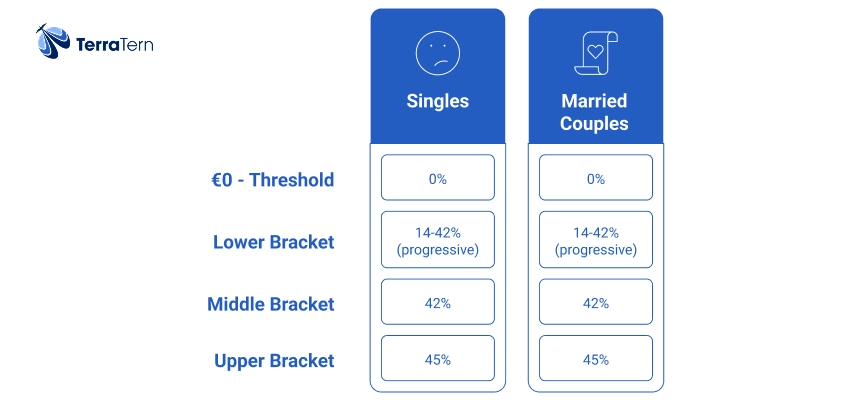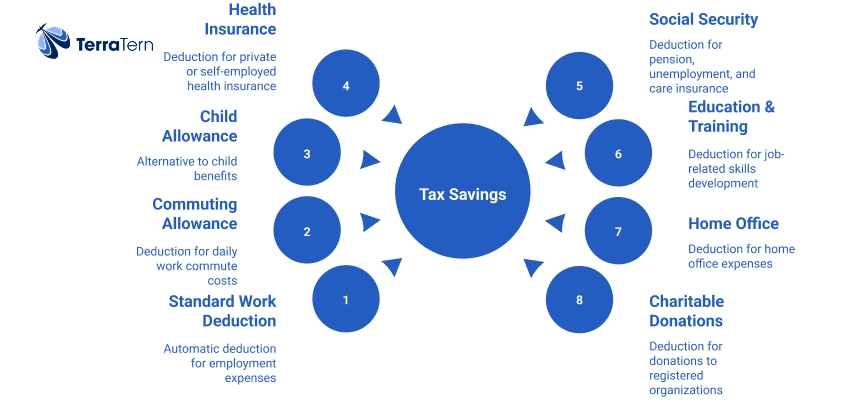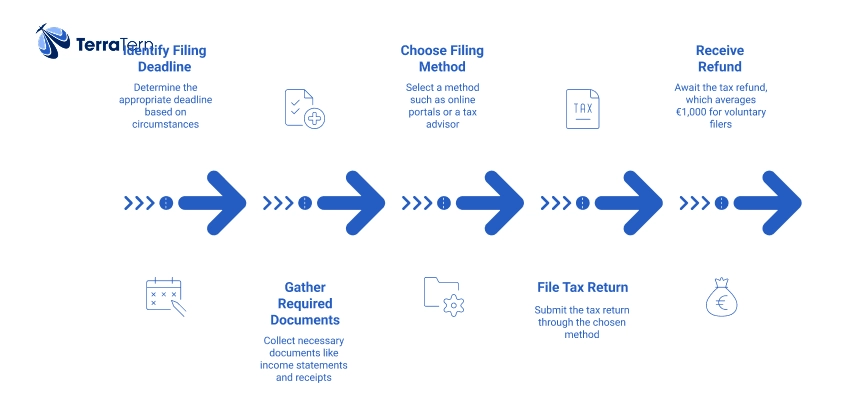Key Highlights
- Understanding Germany's Income Tax System
- Germany Income Tax Slabs for 2025
- Income Tax In Germany for Foreigners in 2025
- Key Tax Deductions and Allowances in Germany 2025
- How to File Your Tax Return in Germany?
- Germany vs Other Countries: Tax Comparison 2025
- Why Choose TerraTern for Germany Immigration and Tax Consulting?
Planning to move to Germany? Understanding the Germany Income Tax is the key to making the most of your earnings! Germany's tax system is progressive, which means that the higher you earn, the more taxes you pay, ranging from 0-45%.

Germany Income Tax system is highly relevant to Expats working or residing in the country. Whether you're an employee, employer, Freelancer or business owner, understanding Tax obligations is necessary. We at Terratern will help you navigate through the Germany Income Tax system because it might seem complex, but with the right knowledge, you can maximise your take-home pay!
Understanding Germany's Income Tax System

Germany Income tax system has many categories and various rates. Understanding each point is crucial and will help you run your finances smoothly in Germany.
Progressive Tax System
Income tax can range from 0% to 45%, depending upon your pay scale.
Residency Based Taxation
Those residents who are residing in Germany for 183 days or more per year are always taxed on the basis of their worldwide income.
For non residents, they are only taxed when they earn income within Germany.
Deductions and Allowances
- Work-related expenses
- Social Security Contributions
- Health insurance and childcare costs
- Special provisions for Expats, including DTAs.
Filing Deadlines
Annual tax returns in Germany are due by 31st July of the following year. Late submissions result in penalties unless an official extension has been granted.
Also Read: Requirements to Work as a Nurse in Germany: Latest Guide
Who Pays Income Tax in Germany?
For the case of Residents and Non Residents, here is a summarised version of Germany Income Tax rules-
|
Residency Status |
Tax Liability |
Scope of Taxation |
|
Resident ( living in Germany for 183+ days every year ) |
Taxed on the basis of worldwide income |
Income earned both abroad and in Germany is Taxable in Germany |
|
Non-resident ( living in Germany for less than 183 days every year ) |
Taxed only on the basis of Germany-based income |
Only Income earned in Germany is applicable to German Income tax |
Key considerations for Worldwide and German source income -
-
Expats classified as residents must report ALL of their earnings, both in Germany and abroad, including salaries, investments, rental income and business profits from other countries.
-
For those earning through German-sourced incomes, non-residents are only taxed on the basis of income earned in Germany, such as salary, rental income from German properties or business earnings in Germany.
-
DTA ( DOUBLE TAXATION AGREEMENTS ): Germany has active agreements with many countries to prevent double Taxation for Expats earning from multiple countries.

Types of Taxable Incomes in Germany
Germany income tax has categories depending upon your occupation for Taxation.
Here's a list of incomes which are Taxable in Germany -
-
Employment wages ( salaries )
-
Self-employment and business income
-
Rental income
-
Capital gains and investments
-
Pensions and other benefits
Understanding these categories is crucial for people to determine their tax obligations and optimise financial planning the right way.
Germany Income Tax Slabs for 2025
A detailed, comprehensive information guide is right here for you to understand Germany income tax slabs where income falls under.
-
Upto 12,096 euros is 0% as a Tax-free allowance
-
From 12,097 to 68,429, it is 14% to 42%, and it slowly goes up from the lower limit at 14 to the upper limit at 42.
-
68,430 to 2,77,825 is 42%
-
Above 2,77,825 is 45%
Germany Income Tax Rates for Single Filers 2025
|
Tax Slab for Single Filers |
Tax Rate % |
|
0-12,096 euros |
0% |
|
12,097 to 68,429 euros |
14-42% |
|
68,430 to 2,77,825 euros |
42% |
|
Above 2,77,825 euros |
45% |
Germany Income Tax Rates for Married Couples
|
Tax Slab for Married Couples |
Tax Rate % |
|
0 to 24,192 euros |
0% |
|
24,193 to 1,36,858 euros |
14-42% |
|
1,36,859 to 5,55,650 euros |
42% |
|
Above 5,55,651 euros |
45% |
Income Tax In Germany for Foreigners in 2025
Germany being a country with diverse people in the workforce, there are a lot of rules and regulations for the finances of the nation. Germany's Income tax system applies to both residents and Non-Residents, including foreigners in the country.
Expats need to understand their tax obligations, incentives, exemptions and much more to maximise their benefits and optimise their tax liabilities.
Guidance for Expats:
-
Register for a Tax ID. ( Steuer ID ) which is required for employment and tax filing.
-
Check residency status to determine global or German-only tax obligations
-
Consider hiring a tax consultant to optimise deductions and avoid double Taxation.
-
File tax returns on time, that is, by 31st July of the following year, to avoid penalties.
Residency Rules and Tax Liability
Tax residency status for foreigners has two categories: Residents and Non-Residents.
Residents -
183+ days in Germany per year and are taxed on worldwide income.
Non-residents -
Less than 183 days in Germany per year and are taxed on German sourced income.

Also Read: ZAB Germany: Application, Processing Time, Documents & More
Exemptions and Tax Benefits for Expats
Expats have numerous benefits of German Income tax system. The key highlights are as follows -
Basic tax-free allowances -
- 12,096 euros for individuals and 24,192 euros for Married Couples.
Work-related expenses -
- Upto 1,230 euros without proof
Moving costs -
- Deductible money is used for relocation to Germany or other cities.
Pension and social security contributions -
- They can be deducted.
Health insurance and childcare costs -
- Partially deductible.
Special exemption through -
- Double Taxation Agreements where Germany has treaties with many countries to avoid getting individuals taxed double on the same income.
- 183-day rule: If an expat works less than 183 days a year in Germany and his employer is non-German, they are not liable for German taxes.
- Expatriate Tax Relief is a special tax deduction for highly skilled professionals under certain conditions.
Double Taxation Avoidance Agreements (DTAAs) 2025
DTAA helps Indian Expats and businesses avoid double Taxation, reduce tax burdens and comply with tax laws in both countries.
Germany Income tax rules in cases of DTAA are as follows -
-
What is DTAA?
It is a treaty between India and Germany to avoid double Taxation, reduce tax burdens and still comply with the tax laws of both countries.
-
Key benefits of DTAA of India and Germany
If tax is paid in either country, the credit can be claimed in the other country.
Certain incomes, such as student scholarships, may be fully or partially exempted.
-
How To Claim DTAA Benefits?
1. Submit a tax residency certificate from your home country.
2. Fill out form 10F with the required documents.
3. Maintain income proof and tax payment records.
Key Tax Deductions and Allowances in Germany 2025

Getting maximum savings through Germany's income tax is a smart move that requires complete knowledge of all deductions and allowances by the government of Germany.
|
Category |
Deduction/Allowance |
Details |
|
Basic Tax-Free Allowance |
12,096 euros for Single and 24,192 euros for Married people |
Income below this level is tax-free. |
|
Work-related expenses |
1,230 euros roughly |
No proof is required, including job-related costs. |
|
Commuting Allowance |
0.30 euros per km up to 20 km and 0.38 euros post that. |
Deductible for the daily work commute. |
|
Social Security Contributions |
Upto 100% deductible |
Includes health pension, unemployment and nursing insurance |
|
Private Health insurance |
Fully or partially deductible |
For self-employed people or those who opt for private health insurance |
|
Child Allowance |
6,612 euros per child |
Alternative to child benefits |
|
Parental Leave Benefits |
Tax-free but affects Germany income tax rates |
Financial support for parents taking time off work to handle kids |
|
Education and training costs |
Upto 6,000 euros a year |
For job-related skills or training |
|
Home office deductions |
6 euros per day |
If no separate office and home space is available |
|
Charitable donations |
Upto 20% of income |
Donations to registered organisations and NGOs |
|
Church tax |
8-9% of income tax |
Deductible if paid |
|
Disability and medical expenses |
Varies |
Based on disability level and medical requirements |
How to File Your Tax Return in Germany?

All steps of filing returns are crucial. Here is a step-by-step guide to filing your Germany Income tax return:
Keep a check if you need to file
-
Mandatory - If you've multiple income sources, are self-employed -or receive certain allowances.
-
Voluntary - Recommended as its refunds average around 1000 euros.
Gather documents
-
Lohnsteuerbescheinigung - It is nothing but the annual income and tax statement from your employer.
-
Steuer ID and Steuernummer - Your tax ID and number
-
Bank details and receipts - To show deductions like work expenses, childcare and education.

Choose a filing method
-
Online - Taxfix, WunderTax, and SteuerGo are some of the famous ones for filing online.
-
Tax Advisor - For complex cases.
-
ELSTER - It's the official free portal, but it is in German.
Know the deadlines
-
Mandatory - July 31st of the following year
-
Voluntary - Upto 4 years
-
With a tax advisor - It is extended to February of next year.
Submit and wait for the refund
-
File online or via mail.
-
Receive a tax assessment notice within 2-6 months.
It is important to keep all receipts and consider professional help to maximise deductions. Our dedicated team at Terratern can help you in easing out your taxes. We have you covered so you can maximise your earnings. Contact us for an appointment today!
Also Read: Top Job Consultancy in Germany: Experts New List
Germany vs Other Countries: Tax Comparison 2025
Comparing Germany Income tax slabs with other countries will give you an insight before you plan to settle anywhere.
Here is a summarised version of income tax in Germany for foreigners and other countries
|
Country |
Income Tax Rate ( lowest ) |
Income Tax Rate ( highest ) |
|
Germany |
14% |
45% |
|
USA |
10% |
37% |
|
UK |
20% |
45% |
|
India |
5% |
30% |
|
Canada |
15% |
33% |
|
Australia |
19% |
45% |
Why Choose TerraTern for Germany Immigration and Tax Consulting?
Choosing to settle abroad can be an overwhelming decision. From seeking a job to learning the new rules and regulations of that nation, it is a crucial task. We at Terratern have a specific and dedicated team of people who will cater to each and every doubt that arises on your path to success.
Our team has features such as job seeking, further education, visa application and processing, and setting and filing your taxes, which are all covered. For further information, book a free appointment with us today. Learn more about Germany Income tax and its complexity to maximise your profits.






